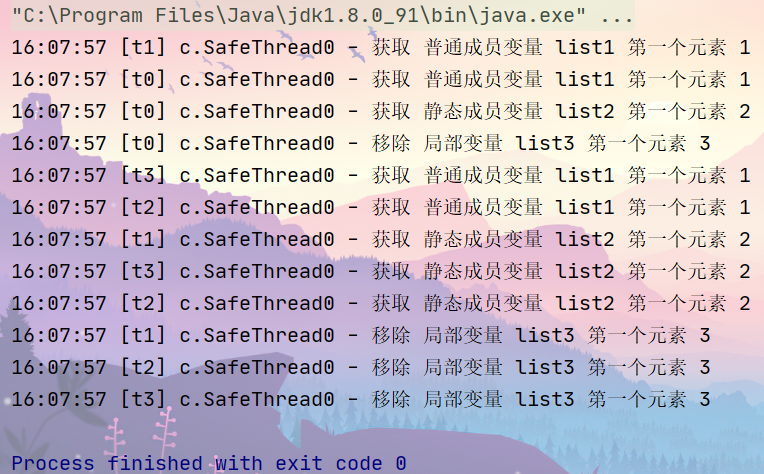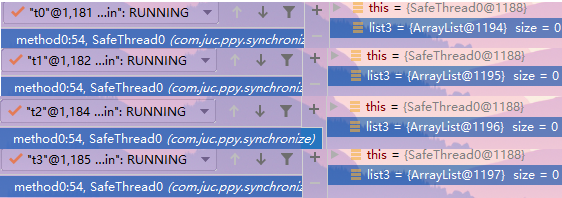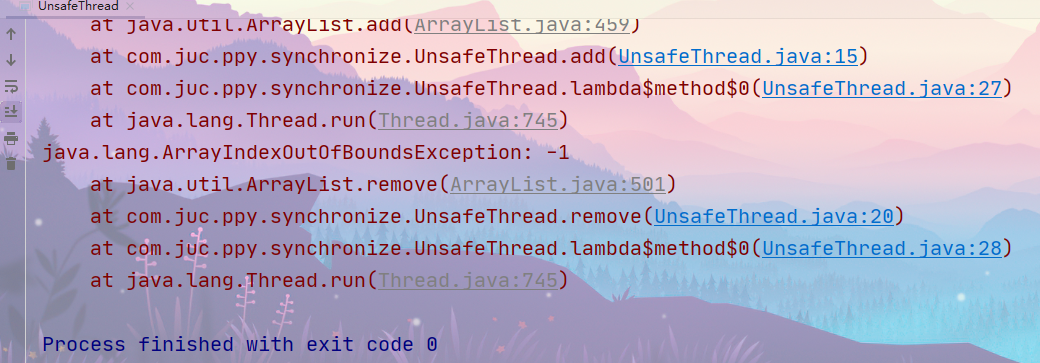catalogue
Single thread operation variable
Multiple threads are read-only to variables or variables do not belong to shared resources
Multithreading can read and write variables
A subclass overrides a parent class method to perform an unknown operation
Variables: normal member variables, static member variables, and local variables
① If the variable does not belong to or is not shared by multiple threads, it is thread safe
② Variables are shared by threads; However, there are only read operations, not any write (modify) operations; Thread safe
Thread safety
Single thread operation variable
@Slf4j(topic = "c.SafeThread")
public class SafeThread {
private List<Integer> list1 = new ArrayList(); // Common member variable
private static List<Integer> list2 = new ArrayList(); // Static member variable
private final int OP_NUM = 1000; // Number of operations
private final void method(){
List<Integer> list3 = new ArrayList(); // local variable
for(int i = 0; i < OP_NUM; i++){
list1.add(i); // Add an element to a normal member variable
list2.add(i); // Add an element to a static member variable
list3.add(i); // Add an element to a local variable
list1.remove(0); // Remove an element from a normal member variable
list2.remove(0); // Remove an element from a static member variable
list3.remove(0); // Remove an element from a local variable
}
log.debug("Final common member variable list1 capacity {}", list1.size());
log.debug("Final static member variable list2 capacity {}", list2.size());
log.debug("Final local variable list3 capacity {}", list3.size());
}
public static void main(String[] args) {
SafeThread st = new SafeThread();
st.method();
}
} 
list1 common member variable, which is a shared resource for the current object
list2 static member variable, which is a shared resource for the current class
list3 local variable, which is a shared resource in method
However, they are only used in one thread (main thread) and are not shared by multiple threads, so they are thread safe
Multiple threads are read-only to variables or variables do not belong to shared resources
@Slf4j(topic = "c.SafeThread0")
class SafeThread0{
private static final int THREAD_NUM = 4; // Number of threads
private List<Integer> list1 = new ArrayList(); // Common member variable
private static List<Integer> list2 = new ArrayList(); // Static member variable
public SafeThread0(){
list1.add(1); // Add element to list1
list2.add(2); // Add element to list2
}
private void method(List<Integer> list3){
log.debug("Get normal member variable list1 First element {}", list1.get(0));
log.debug("Get static member variable list2 First element {}", list2.get(0));
log.debug("Remove local variables list3 First element {}", list3.remove(0)); // There are write operations here, but they are thread safe
}
private void method0(){
List<Integer> list3 = new ArrayList();
list3.add(3);
method(list3);
}
public static void main(String[] args) {
SafeThread0 sf = new SafeThread0();
for(int i = 0; i < THREAD_NUM; i++){
new Thread(() -> {
sf.method0();
}, "t" + i).start();
}
}
}
The program ends normally
① list1 and list2 belong to shared resources for threads t0 ~ t3, but only read operations, thread safety
② When the list3 thread t0 ~ t3 calls the method, a new method will be created, which is not a shared variable and is thread safe

Thread unsafe condition
Multithreading can read and write variables
@Slf4j(topic = "c.UnsafeThread")
public class UnsafeThread {
private final int THREAD_NUM = 10;
private final int OP_NUM = 1000;
private List<Integer> list = new ArrayList();
private void add(){
list.add(1);
}
private void remove(){
list.remove(0);
}
private void method(){
for(int i = 0; i < THREAD_NUM; i++){
new Thread(() -> {
for(int j = 0; j < OP_NUM; j++){
add();
remove();
}
}, "t" + i).start();
}
}
public static void main(String[] args) {
new UnsafeThread().method();
}
}
When the number of threads is small and the number of executions is small, exceptions may not be thrown; But these are accidental. It is unsafe for multithreads to read and write variables
A subclass overrides a parent class method to perform an unknown operation
class SafeBefore{
public void method(List<Integer> list){
add(list);
remove(list);
}
private void add(List<Integer> list){
list.add(1);
}
public void remove(List<Integer> list){ // The parent class exposes internal methods
list.remove(0);
}
}
class UnsafeAfter0 extends SafeBefore{
@Override
public void remove(List<Integer> list) { // Class override parent method
list.remove(0);
list.remove(0);
}
}
class Test8{
public static void main(String[] args) {
SafeBefore uf = new UnsafeAfter0();
List<Integer> list = new ArrayList();
uf.method(list);
}
}
class UnsafeAfter1 extends SafeBefore{
@Override
public void remove(List<Integer> list) { // Class override parent method
new Thread(() -> { // Directly create a new thread to turn the list into a shared resource
list.set(1, 1);
}, "Unsafe1").start();
}
}
class Test8{
public static void main(String[] args) {
SafeBefore uf = new UnsafeAfter1();
List<Integer> list = new ArrayList();
uf.method(list);
}
}
① Although there is only one thread in main, the class overrides the parent class method, which is a messy operation; Directly lead to thread insecurity
② A new thread "Unsafe1" is directly created to turn the list into a shared resource. The new thread also writes to the list
Methods in a class, involving specific implementation or thread safety issues; It's best not to expose it and decorate it with private final